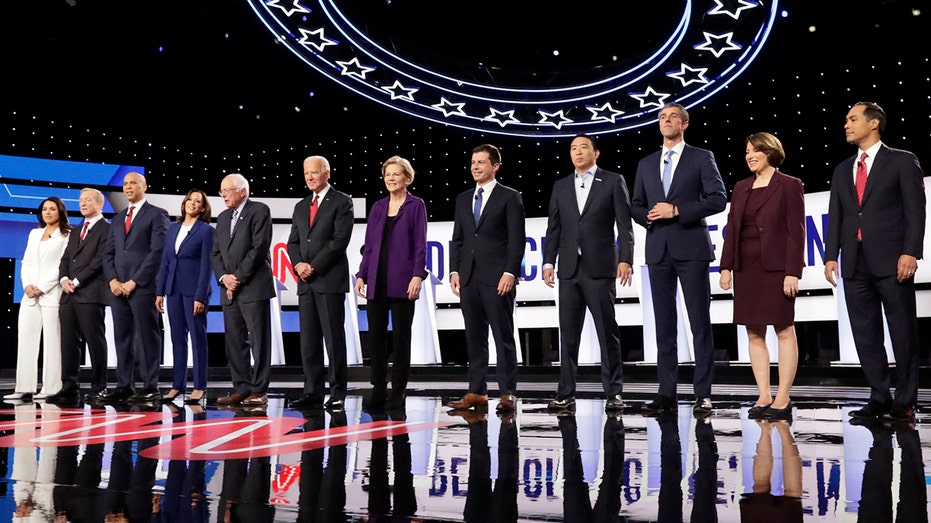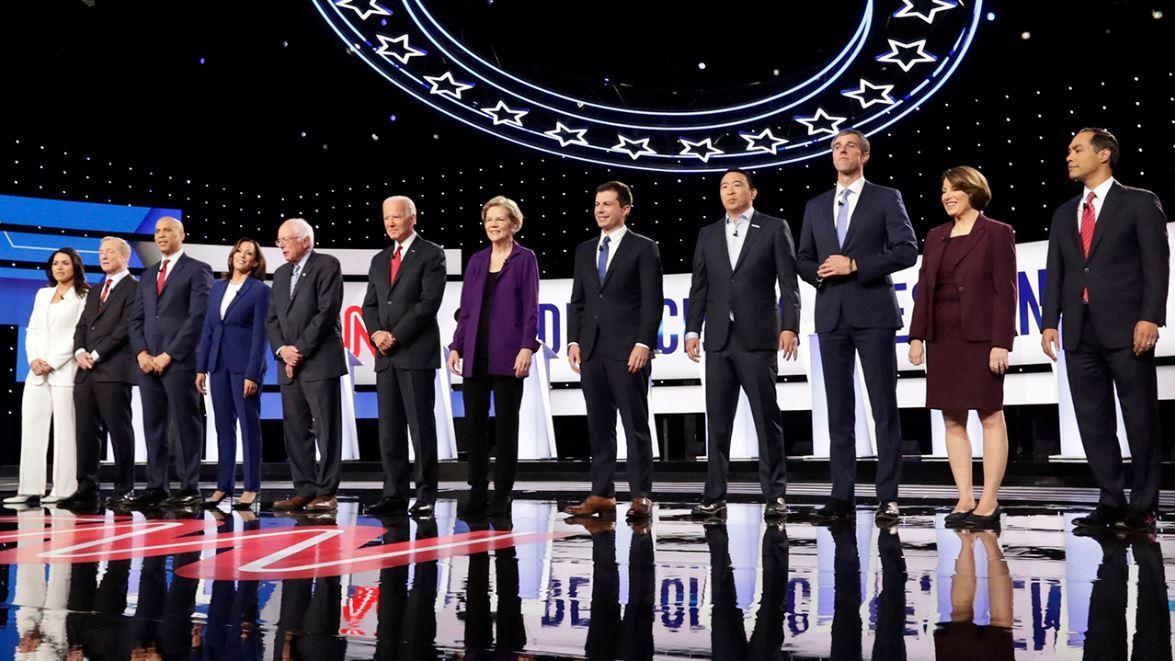Andy Puzder: Here are the 7 most ridiculous economic proposals from the Dem debate
Twelve Democratic presidential hopefuls took the debate stage Tuesday night and espoused a flurry of terrible economic policy proposals. While not a comprehensive list, here’s one concerned American’s thoughts on their seven most glaring mistakes and omissions regarding the economy.
1. No plan

From left, Democratic presidential candidates, Rep. Tulsi Gabbard, D-Hawaii, businessman Tom Steyer, Sen. Cory Booker, D-N.J., Sen. Kamala Harris, D-Calif., Sen. Bernie Sanders, I-Vt., former Vice President Joe Biden, Sen. Elizabeth Warren, D-Mass.,
Let’s start with a glaring omission: No one proposed a plan to grow the economy.
Not one candidate said anything like, “Here’s how I’ll encourage American entrepreneurs to grow their businesses, creating jobs and the competition for employees that drives wage growth for working Americans.”
Instead, every policy proposal boiled down to dividing our economic pie into smaller pieces. Rather than proposing to grow that pie, the candidates simply assumed economic growth would continue - as if it were a given. It’s not.
Instead, every policy proposal boiled down to dividing our economic pie into smaller pieces. Rather than proposing to grow that pie, the candidates simply assumed economic growth would continue - as if it were a given. It’s not.
2. Grow the government
Every proposed solution was based on empowering government, diminishing our freedom, increasing our taxes, regulating our businesses and creating massive – unprecedented - government dependence.
No matter how benevolent they might sound, we should all be suspicious of anyone who asks us to sacrifice our freedoms, expand and empower the government and then put them in charge. Do we really trust our politicians that much?
3. Middle class to pay?
For example, Medicare-for-all. Even assuming we wanted to eliminate all private insurance, could we pay for it?
The Mercatus Center, a think tank at George Mason University, “conservatively” found that “Medicare-for-all” would cost taxpayers $32.6 trillion over a 10-year period, even with associated cost savings, an average of about $3.26 trillion per year.
The federal government’s total revenue for fiscal year 2018 was $3.3 trillion and even that was insufficient to cover the government’s existing expenses -- which totaled $4.1 trillion.
No wonder Sen. Elizabeth Warren, D-Mass., refused to answer any questions about increasing taxes for the middle class. As Sen. Bernie Sanders, I-Vt., admitted, they would – and a lot.
4. $9 trillion per year
In addition to Medicare-for-all, we have the Green New Deal. In addition to severe restrictions on our freedoms and an unprecedented expansion of government power, a study by The American Action Forum, co-authored by the former director of the nonpartisan Congressional Budget Office, found that the GND could cost as much as $93 trillion over a ten year period. The GND includes universal health care, so we’re looking at an average of about $9 trillion per year.
GET FOX BUSINESS ON THE GO BY CLICKING HERE
Again, that’s with current government revenue of $3.3 trillion that is already insufficient to cover $4.1 trillion in spending. Seriously, where do these candidates think this money will come from?
5. Back to taxing the middle class -- a lot
One proposal they all support is getting rid of those pesky Trump tax cuts to increase income taxes on the wealthy. Well, in 2016 (the most recent year for which the numbers are available), taxpayers making over about $500,000 had total income of $2 trillion. So, even a 100% tax on “the wealthy” would be insufficient to fund just “Medicare-for-all,” let alone the whole GND package.
And that’s assuming wealthy people would continue generating income if they had to pay it all to the government. Just an FYI, they wouldn’t. That puts us back to taxing the middle class – a lot.
6. Wouldn’t you move?
How about an additional wealth tax on assets, as both Warren and Sanders propose?
Wealth taxes don’t work. In 1990, there were 12 countries in Europe that had a wealth tax. Today there are three. These taxes failed because, among other things, they push people - and their wealth – to other more tax-friendly countries. They are costly to enforce, and raise little revenue.
Think about it. Over 25 years, the cumulative effect of even a 2% annual tax on wealth (as Warren proposes) would result in taxes equivalent to about 40% of that wealth. If you could move to a more tax-friendly nation and keep that 40%, wouldn’t you move?
Wealthy people can - and do.
7. Working Americans left out
Perhaps the crowning mistake on the debate stage last night was the failure of any candidate to acknowledge that, under President Trump’s free market policies – the very policies these Democrats would reverse - things are actually going better than they have in decades for working Americans.
More Americans are employed than at any time in our nation’s history, the unemployment rate is at a 50-year low, and the competition for employees is driving wage growth. In September, workers’ wages increased 3.5% year over year, the 14th consecutive month workers’ wages have been at or above 3%. Prior to this streak, workers’ wages hadn’t hit 3% growth since May of 2009.
Given this wage growth, and despite what you heard on the debate stage, in September the Census Bureau reported that an analysis of household income -- that considered the actual size of each household -- showed a “significant” decrease in income inequality last year. The Census Bureau describes the survey supporting this finding as the “leading source” for national data on income and poverty.
Didn’t hear anything about that last night, did we?
This election is increasingly about a choice between continued economic growth and improved financial circumstances for working Americans or policies that we cannot pay for, that cannot work, and that ignore one truly American principal: Free individuals pursuing their dreams, create wealth and prosperity.
Big government does not.
Andy Puzder was chief executive officer of CKE Restaurants for more than 16 years, following a career as an attorney. He was nominated by President Trump to serve as U.S. labor secretary. In 2011, Puzder co-authored "Job Creation: How It Really Works and Why Government Doesn't Understand It." His latest book is "The Capitalist Comeback: The Trump Boom and the Left's Plot to Stop It" (Center Street, April 24, 2018).




















